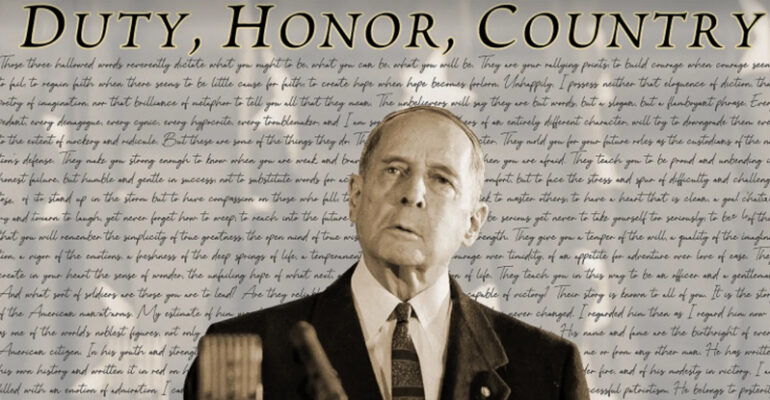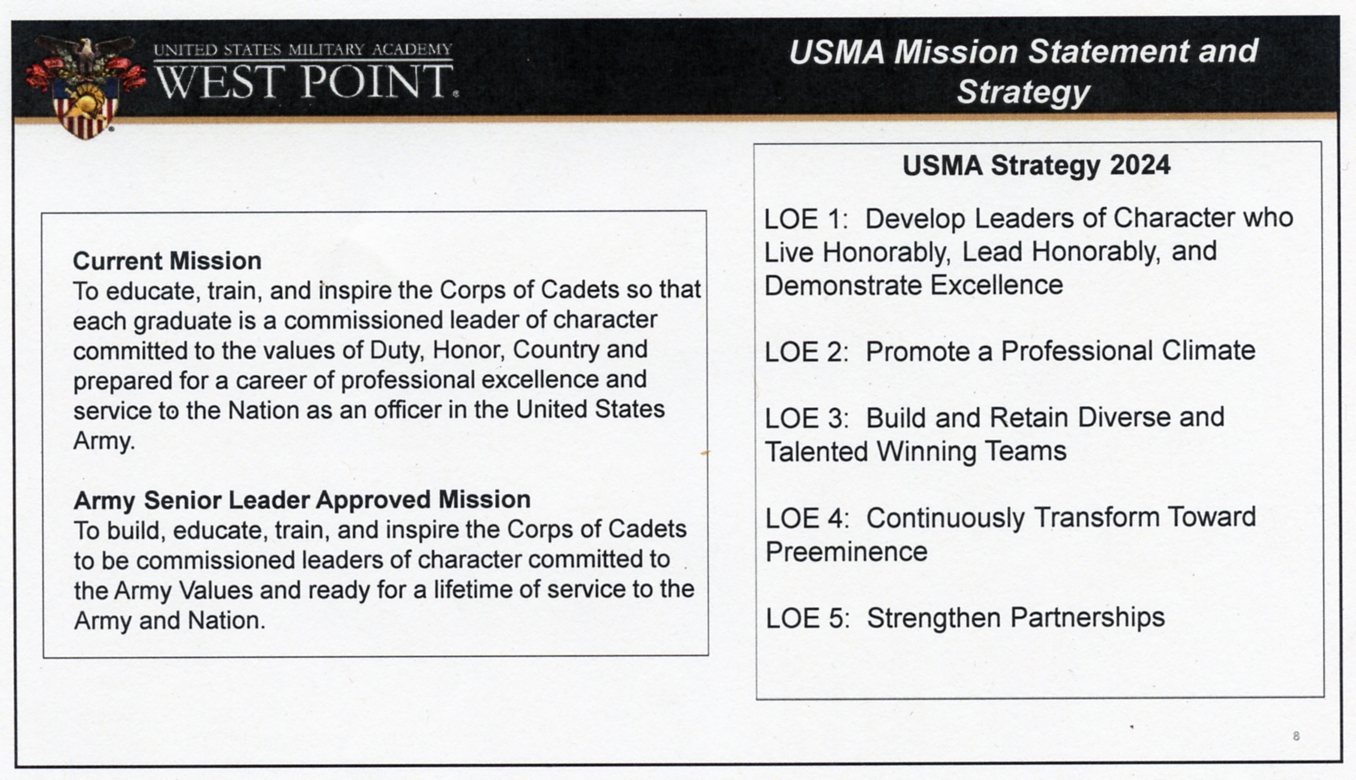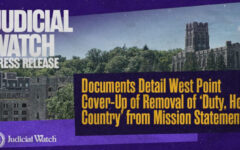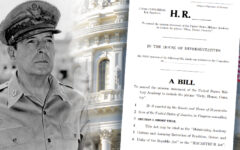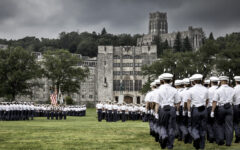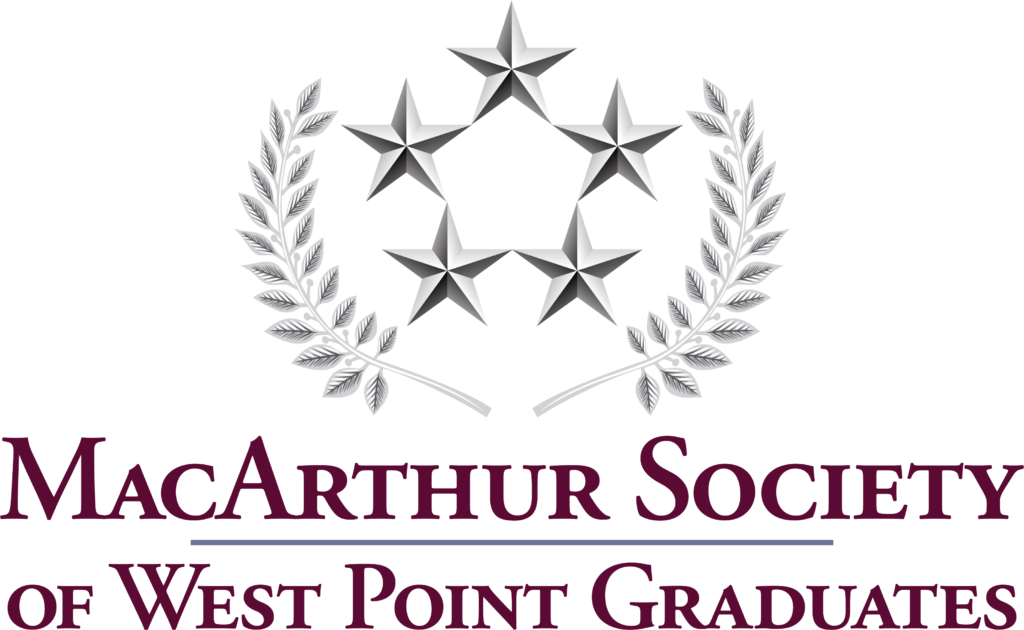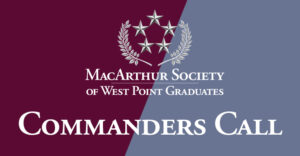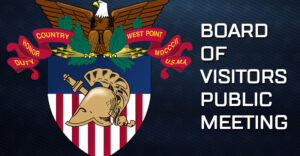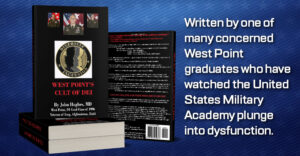West Point Deletes “Duty Honor Country” from its Mission Statement
14 March 2024 2024-03-14 23:00West Point Deletes “Duty Honor Country” from its Mission Statement
By John A. Lucas, USMA ’69
Army Ranger and Special Forces Green Beret; served with the 1st Calvary Division in Vietnam
First published on John’s Bravo Blue Substack
Duty – Honor – Country. Those three hallowed words, reverently dictate what you ought to be, what you can be, and what you will be. They are your rallying points: to build courage, when courage seems to fail; to regain faith, when there seems to be little cause for faith; to create hope when hope becomes forlorn.
Douglas MacArthur graduated from West Point in 1903. By that time, “Duty Honor Country” was already recognized as the official West Point motto. Since then, it has become ubiquitous – Among many other things, it is on the West Point crest that is on every graduate’s class ring. It is fair to say that it is imbedded in every West Point graduate’s heart and brain. Some may falter, but it remains the standard for professionalism.
THE CHANGE IN WEST POINT’S MISSION
But like other traditional values in the military and throughout our culture and society, these “three hallowed words” now appear to be at risk of diminished importance.
At a meeting of the West Point Board of Visitors on March 7, the Superintendent of the United States Military Academy at West Point, LTG Steve Gilland, announced a planned change to the stated mission of the United States Military Academy at West Point by eliminating the words “Duty,” “Honor” and “Country” from its official mission statement.
This is the presentation that LTG Gilland gave to the Board of Visitors about the change:
As you can see, an unidentified “Army Senior Leader” has approved the change in the Mission Statement to remove the reference to West Point’s motto, “Duty, Honor, Country,” and substituting a goal of graduating leaders committed to the “Army Values.” West Point does not identify the current seven “Army Values” in the new Mission Statement; you must navigate to another link to see them.
THE IMPORTANCE OF THE MISSION STATEMENT
The definition of any military unit’s mission is central to everything it does. Everything, planning, training, execution – everything – is compelled by the unit’s defined mission.
And the more simply it can be stated, the better.
My favorite example is the mission that that Combined Chiefs of Staff gave to General Eisenhower in 1944:
“Enter the continent of Europe and, in conjunction with the other United Nations, undertake operations aimed at the heart of Germany and the destruction of her armed forces.
After reading just those 28 words, Ike knew exactly what he had to do in one of the most complex military operations in history: Invade Europe and destroy the German Wehrmacht.
So, like the Combined Chiefs’ mission order to General Eisenhower, the West Point Mission Statement tells all its faculty and staff, exactly what they must do in training new officers. It literally defines the professional purpose for their existence.
BLOWBACK AND THE HASTY RELEASE OF THE NEW MISSION
The change first made news on Saturday in a short article in the Armed Forces Press. On Monday, it was publicized by the MacArthur Society, a group of West Point graduates concerned about the some of the current trends at West Point. The MacArthur Society’s President, Bill Prince, is a West Point graduate and decorated CIA veteran who attended the Board of Visitors meeting where the change was announced.
As news of the change began to migrate to various other media, the initial reaction by many who read it was that it was fake news. It had to be fake news because “Duty Honor Country” was so fundamental to West Point’s core identity, that it was inconceivable that it anyone would excise it from the official West Point Mission Statement.
Many West Point graduates perceive the change as another woke attack on tradition. There have been all too many of those, both at West Point and throughout society and the country.
At West Point, for example, Robert E. Lee’s name was removed from West Point’s Reconciliation Plaza, which had commemorated General Lee’s contribution to the reconciliation of opposing forces and peoples after the Civil War. The irony of removing any reference to General Lee from a memorial to reconciliation apparently escaped the perpetrators of the purge.
And, of course, the removal and destruction of statues, from Christopher Columbus to Presidents Lincoln and Teddy Roosevelt, also came to mind immediately.
An attack on “Duty Honor Country” seemed like more of the same.
After seeing the initial reports, I spoke with several people at West Point. I understood from these conversations that the decision had not yet been finalized and might not be for at least several days, and that West Point might even seek Congressional approval for the change.
Later in the day, likely because of the emerging blow-back against the decision, LTG Gilland sent a letter to all West Point graduates announcing the fait accompli – the change had now been implemented.
WEST POINT’S JUSTIFICATION OF THE CHANGE
An officer with whom I spoke emphasized that the change was the result of a regular review of the Mission Statement to see if any changes were needed to “modernize” it.
LTG’s Gilland’s letter made the same point and that the Mission Statement has been changed nine times in the past 100 years. Such changes are sometimes necessary. For example, shortly after women were first admitted as Cadets in 1976, the Mission Statement was modified to make it gender neutral.
I do not believe that the Superintendent was trying to diminish the value and centrality of the West Point motto that is at least 125 years old. I give the LTG Gilland the benefit of any doubt with it comes to motive. LTG Gilland is a patriot, and I firmly believe that he has the best interests of West Point and of the Country at heart.
His chief spokesman, Colonel Terence Kelley, emphasized that when he told me, “Great young men and women are graduating from West Point to lead soldiers on the battlefield. That is what we are focused on.”
DO WEST POINT’S JUSTIFICATIONS HOLD WATER? DOUBTFUL.
Even though I am willing to presume their good faith, I understand why some are skeptical about the West Point brass, given what we have learned about “politicization of the curriculum, the erosion of the honor code and race and gender-based admissions.”
I will not attempt to discuss those issues here; the MacArthur Society documents them in depth. The present point is that these policies have undermined the Academy leadership’s credibility when they want to justify controversial decisions.
West Point’s principal justification for the change is that they wanted the Mission Statement to incorporate to the “Army Values” that were adopted in 1995, so “Duty Honor Country” had to be removed. In support of this argument, although the West Point motto dates back at least 125 years, West Point officials point out that it was not included in the Mission Statement until 1998.
The Army Values are virtues that no one can rightly quarrel with.
But the simplicity of just three words – Duty Honor Country – has a power far greater than the word salad that comprises the Army Values and their official explanation.
Here are just two examples why that is true: Consider the Army’s description of two Army Virtues, “Duty” and “Honor.”
Here is what the Army’s official site has to say about Duty:
“Fulfill your obligations. Doing your duty means more than carrying out your assigned tasks. Duty means being able to accomplish tasks as part of a team. The work of the U.S. Army is a complex combination of missions, tasks and responsibilities — all in constant motion. Our work entails building one assignment onto another. You fulfill your obligations as a part of your unit every time you resist the temptation to take “shortcuts” that might undermine the integrity of the final product.”
Which has a more powerful impact, that 81-word explanation of “Duty,” which has all the earmarks of having been written by a committee, or General MacArthur’s own Mission Statement in his charge to the Corps about what Duty requires?
He said simply,
“Your mission remains fixed, determined, unchanging. It is to win our wars.”
And what about Honor? Again, here is the Army’s explanation of that Army Value:
“Live up to Army values. The nation’s highest military award is The Medal of Honor. This award goes to Soldiers who make honor a matter of daily living — Soldiers who develop the habit of being honorable, and solidify that habit with every value choice they make. Honor is a matter of carrying out, acting, and living the values of respect, duty, loyalty, selfless service, integrity and personal courage in everything you do.”
Just the first sentence takes us into an endless möbius loop.
Contrast that, if you will, with the simplicity of the Cadet Honor Code:
“A Cadet will not lie, cheat, steal, or tolerate those who do.”
Which is more powerful? Which will be remembered forever?
THE RISK TO THE ARMY’S MISSION OF WINNING OUR WARS
Jettisoning the motto from West Point’s Mission Statement is not wrong just because it dilutes the force of the words. In today’s environment, it poses a real risk to the substance of West Point’s mission.
Why? Because West Point is not the custodian of the Army Values. They can be changed by political appointees.
For example, it is all to easy to envision the day under a “progressive” administration when “Diversity Equity and Inclusion” will be included in the Army Values.
If you think that is an exaggeration, please consider the fact that SECDEF Lloyd Austin has officially designated climate change as a critical national security issue that is as much of a threat as Communist China. Can DEI be far behind?
So, although I understand the rationale for the decision and accept that West Point was operating in good faith, I have yet to hear a persuasive reason why “Duty Honor Country” has been excised from the Mission Statement.
Absent such an explanation, we are justified in questioning whether people of good faith are being duped by people of bad faith.
As the patriots in the MacArthur Society put it,
“Like in many great institutions in the United States of America, progressive ideology is eroding away at West Point and doing so in a slow but methodical march, co-opting our good intentions through the specter of cultural Marxism. Our adversaries are unscrupulous but sophisticated and very patient.”
THE LAST WORD
The last word is reserved for General MacArthur’s pure poetry in his closing to the Corps, which again emphasized the importance of those three little words:
“The shadows are lengthening for me. The twilight is here. My days of old have vanished tone and tent; they have gone glimmering through the dreams of things that were. Their memory is one of wondrous beauty, watered by tears, and coax and caressed by the smiles of yesterday.
“I listen vainly, but with thirsty, ear, for the witching melody of faint, bugles, blowing reveille, of far drums beating the long roll. In my dreams, I hear again the crash of guns, the rattle of musketry, the strange, mournful mutter of the battlefield.
“But in the evening of my memory, I always come back to West Point. Always there echoes and echoes duty – honor – country.”

